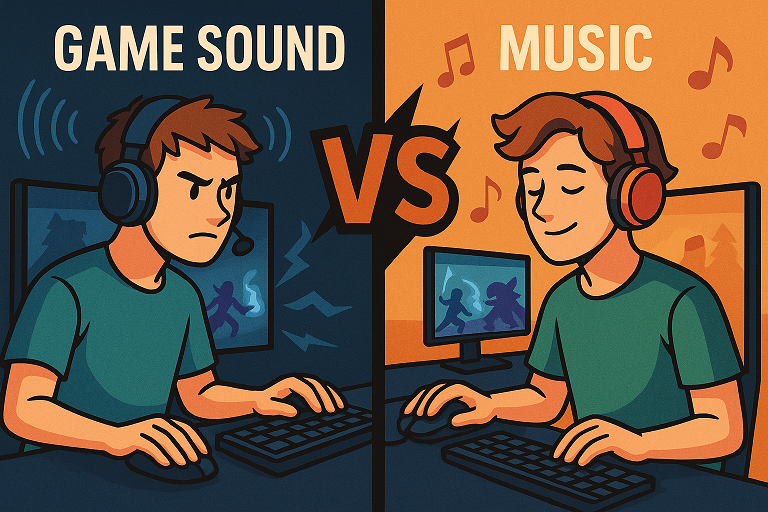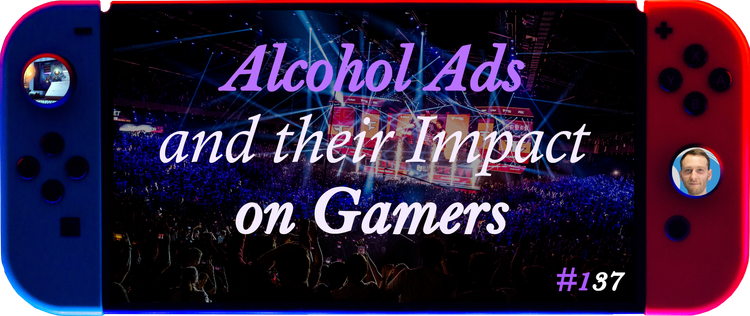Game Sound vs. Music: Do They Impact Gaming Performance?

Before we jump into today's episode, let me quickly highlight that, together with Dr. Raetze and Dr. Hüllmann, we published a literature review (analyzing 92 studies) on factors that impact the performance of esports teams. It's open access—check it out here!
Lots of us gamers listen to music while playing. This begs the question of whether this trade-off between music and game sound impacts gaming performance. Let's see what the science says.
• Sound provides important information in the real world and in-game.
• Most studies show mixed results when it comes to the link between performance and sound on/off.
• The study finds mixed results: sound improved about 50% of performance measures in Dota 2, and showed no changes or even decline in others.
• These results were the case at the individual and team level.
• The study has some major limitations (mainly the number of participants and matches played). However, it appears that playing music instead of game sound may be a personal choice with different benefits each.
🎵 Why Do Sounds Matter in Games?
"For game developers, integrating informative sound has the potential to provide additional feedback to the player." [1]
Sound, in real life, is an important source of information. Hence, this might also be the case in gaming, specifically esports. The study we'll be discussing today examines if in-game sound, and individual and team performance are linked.
In other fields such as psychology and heal care, it was shown that implementing sounds that provide specific information indeed contribute to performance. However, the results in gaming so far are mixed. For instance, in DOOM, participants got double the points compared to those who didn't play with sound. Another study found that players who listened to music unrelated to the game performed better than those with in-game sound.
In Dota 2, auditory feedback highlights when certain hero abilities have been activated, sending an "urgency warning" to players. "These signals make the player aware that they need to respond shortly or may highlight emergency situations, which demand immediate attention." [1]
Furthermore, in team games such as Dota 2, auditory cues provide the same information to all five team players, regardless of their viewpoint. So, even looking at something else, players can pick up certain information that they would have otherwise not gathered.
In the experiment conducted by the researchers, 20 participants were divided into two groups: novice players and experienced players. The expert players (15) were then split into 3 teams of 5 players and played each other in a round-robin tournament (every team plays against each other team). In each match, one team played with sound and the other without. One team of novice players were instead placed in one team each.
"The performance measure for teams consisted of: Total gold earned; Total experience points earned; Total hero kills and; Total hero deaths." [1]
🔊 When Sound Helps — and When It Doesn’t
As you can see in the figure below both, individual and team performance were worse when sound was off, compared to when in-game sound was on.

However, after analyzing the data in more depth, the results weren't as clear anymore. At the individual level, performance increases for over 50% of the measures, but the rest either showed no difference or even reduced performance. A similar pattern was found by the researchers at the team level, where 9 performance measures improved, whereas 7 worsened with sound.
"A post survey conducted after the experiment revealed that 18 of the 20 players felt that removing sound affected their performance negatively. [1]"
🔇 Should You Game with Music or Sound?
As you can probably guess, these study results should be taken with a grain of salt, because the number of games and participants were very low. The authors themselves noted that a lot of other factors (i.e., strategy, hero choices etc.) could have influenced the outcomes.
However, from my personal experience as an esports tournament referee, I can tell you that some players prefer to play with music while others don't. I asked a progamer once why the played with music and said that it helps him to get into a good mood and focus better.
So maybe it's more of a personal (or even genre-specific) choice, whether your performance is better with in-game sound or music. That would be a nice little study for each of you gamers out there. 😄
Keep your ears open. See you next week. Cheers,
Christian 🙂

References
[1] Ng et al., 2015






